Evaluating the Contemporary Global Business Environment Report
VerifiedAdded on 2022/09/15
|9
|2429
|14
Report
AI Summary
This report provides a comprehensive analysis of the global business environment in the first quarter of 2020. It evaluates the current roles of culture, governments, and international organizations in promoting global trade, highlighting their impact on economic growth, investment, and job creation. The report assesses the opportunities and threats posed by cultural differences, including international recruiting and potential conflicts. It further examines the risks, costs, and benefits of doing business in different countries, considering factors such as economic instability, currency fluctuations, and market trends. The analysis incorporates examples and evidence to support its views, offering insights into the challenges and prospects for businesses operating in the global market. The report also discusses the role of international organizations like the IMF, WTO and EU in promoting global trade and facilitating economic development.
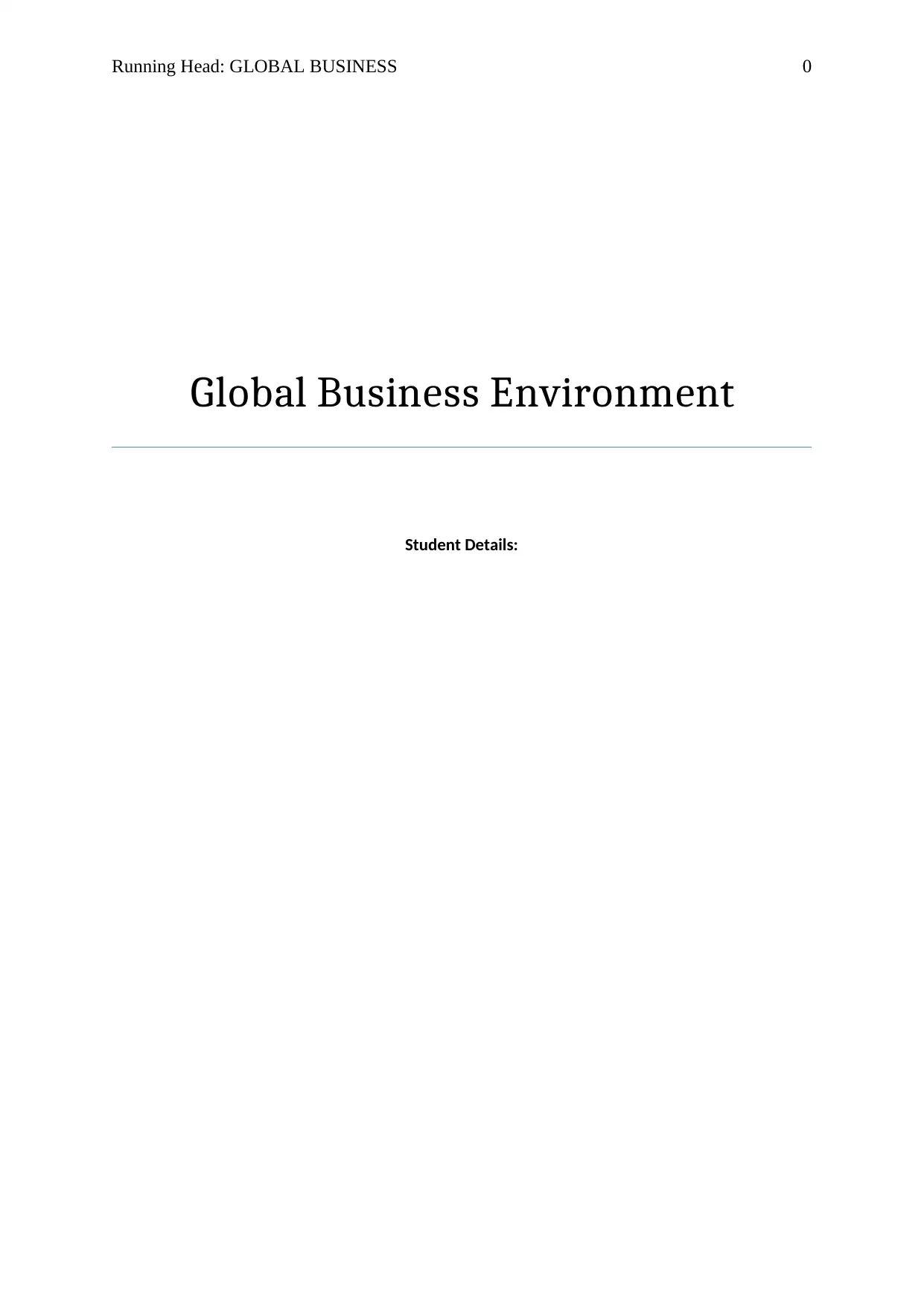
Running Head: GLOBAL BUSINESS 0
Global Business Environment
Student Details:
Global Business Environment
Student Details:
Paraphrase This Document
Need a fresh take? Get an instant paraphrase of this document with our AI Paraphraser
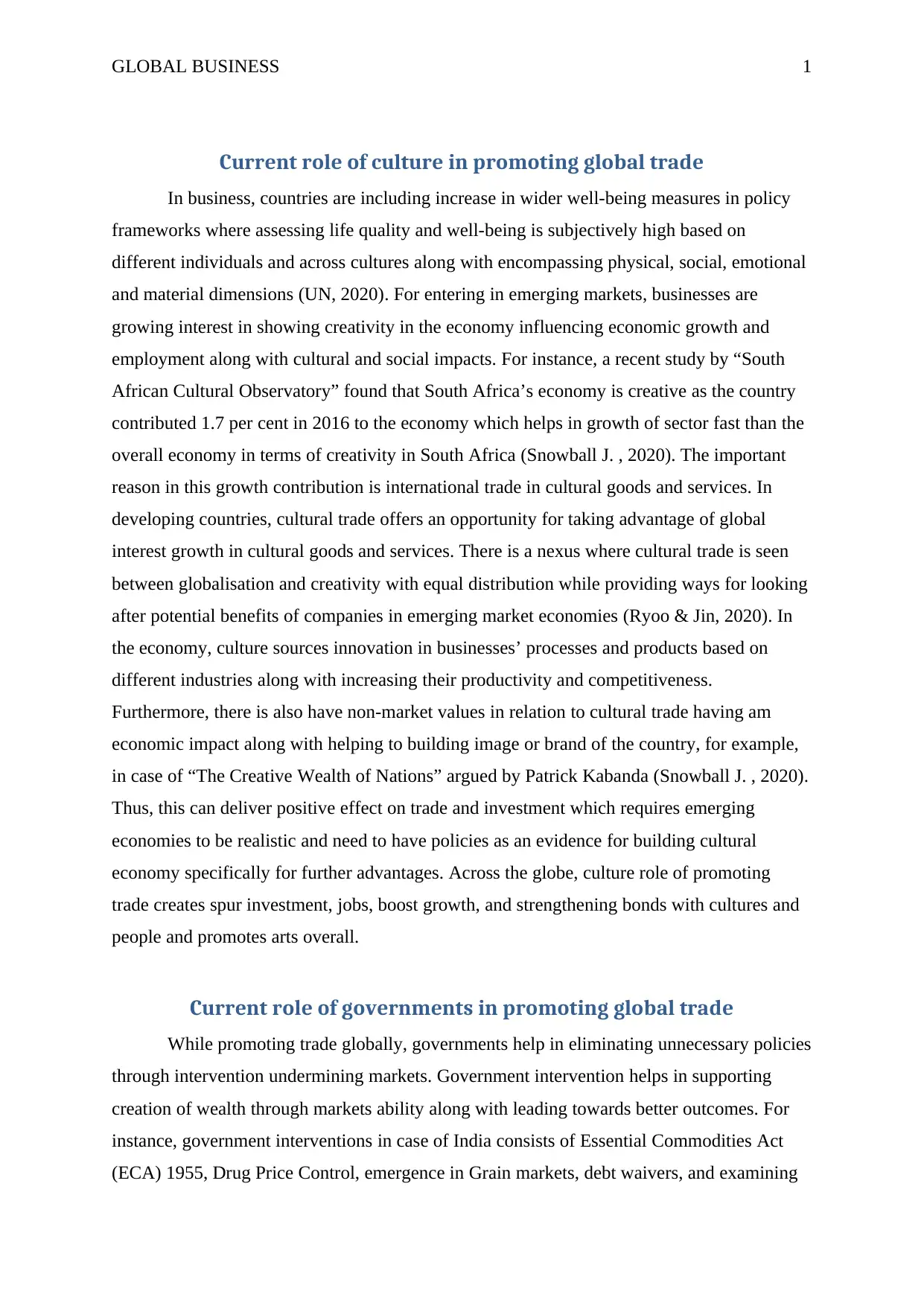
GLOBAL BUSINESS 1
Current role of culture in promoting global trade
In business, countries are including increase in wider well-being measures in policy
frameworks where assessing life quality and well-being is subjectively high based on
different individuals and across cultures along with encompassing physical, social, emotional
and material dimensions (UN, 2020). For entering in emerging markets, businesses are
growing interest in showing creativity in the economy influencing economic growth and
employment along with cultural and social impacts. For instance, a recent study by “South
African Cultural Observatory” found that South Africa’s economy is creative as the country
contributed 1.7 per cent in 2016 to the economy which helps in growth of sector fast than the
overall economy in terms of creativity in South Africa (Snowball J. , 2020). The important
reason in this growth contribution is international trade in cultural goods and services. In
developing countries, cultural trade offers an opportunity for taking advantage of global
interest growth in cultural goods and services. There is a nexus where cultural trade is seen
between globalisation and creativity with equal distribution while providing ways for looking
after potential benefits of companies in emerging market economies (Ryoo & Jin, 2020). In
the economy, culture sources innovation in businesses’ processes and products based on
different industries along with increasing their productivity and competitiveness.
Furthermore, there is also have non-market values in relation to cultural trade having am
economic impact along with helping to building image or brand of the country, for example,
in case of “The Creative Wealth of Nations” argued by Patrick Kabanda (Snowball J. , 2020).
Thus, this can deliver positive effect on trade and investment which requires emerging
economies to be realistic and need to have policies as an evidence for building cultural
economy specifically for further advantages. Across the globe, culture role of promoting
trade creates spur investment, jobs, boost growth, and strengthening bonds with cultures and
people and promotes arts overall.
Current role of governments in promoting global trade
While promoting trade globally, governments help in eliminating unnecessary policies
through intervention undermining markets. Government intervention helps in supporting
creation of wealth through markets ability along with leading towards better outcomes. For
instance, government interventions in case of India consists of Essential Commodities Act
(ECA) 1955, Drug Price Control, emergence in Grain markets, debt waivers, and examining
Current role of culture in promoting global trade
In business, countries are including increase in wider well-being measures in policy
frameworks where assessing life quality and well-being is subjectively high based on
different individuals and across cultures along with encompassing physical, social, emotional
and material dimensions (UN, 2020). For entering in emerging markets, businesses are
growing interest in showing creativity in the economy influencing economic growth and
employment along with cultural and social impacts. For instance, a recent study by “South
African Cultural Observatory” found that South Africa’s economy is creative as the country
contributed 1.7 per cent in 2016 to the economy which helps in growth of sector fast than the
overall economy in terms of creativity in South Africa (Snowball J. , 2020). The important
reason in this growth contribution is international trade in cultural goods and services. In
developing countries, cultural trade offers an opportunity for taking advantage of global
interest growth in cultural goods and services. There is a nexus where cultural trade is seen
between globalisation and creativity with equal distribution while providing ways for looking
after potential benefits of companies in emerging market economies (Ryoo & Jin, 2020). In
the economy, culture sources innovation in businesses’ processes and products based on
different industries along with increasing their productivity and competitiveness.
Furthermore, there is also have non-market values in relation to cultural trade having am
economic impact along with helping to building image or brand of the country, for example,
in case of “The Creative Wealth of Nations” argued by Patrick Kabanda (Snowball J. , 2020).
Thus, this can deliver positive effect on trade and investment which requires emerging
economies to be realistic and need to have policies as an evidence for building cultural
economy specifically for further advantages. Across the globe, culture role of promoting
trade creates spur investment, jobs, boost growth, and strengthening bonds with cultures and
people and promotes arts overall.
Current role of governments in promoting global trade
While promoting trade globally, governments help in eliminating unnecessary policies
through intervention undermining markets. Government intervention helps in supporting
creation of wealth through markets ability along with leading towards better outcomes. For
instance, government interventions in case of India consists of Essential Commodities Act
(ECA) 1955, Drug Price Control, emergence in Grain markets, debt waivers, and examining
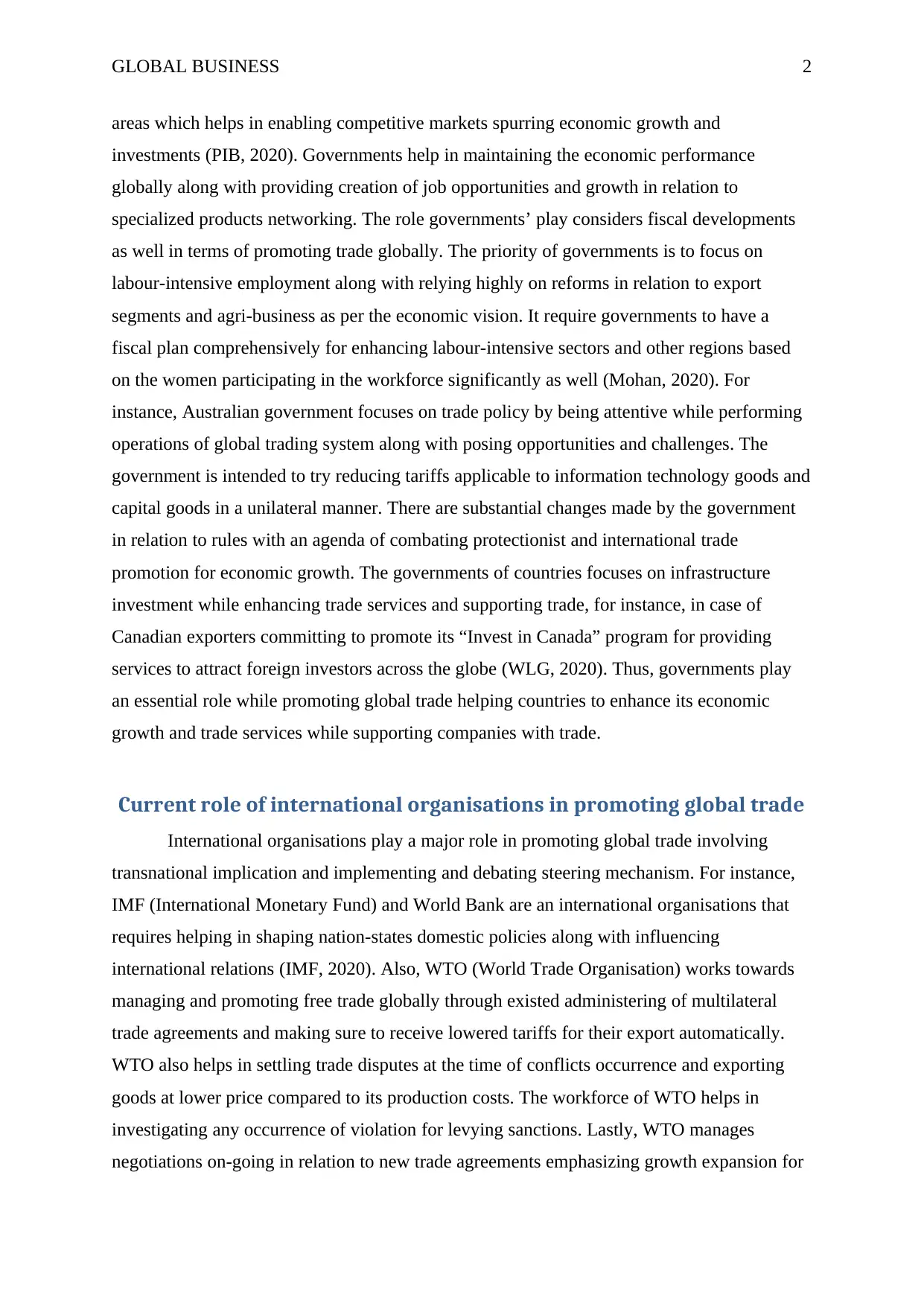
GLOBAL BUSINESS 2
areas which helps in enabling competitive markets spurring economic growth and
investments (PIB, 2020). Governments help in maintaining the economic performance
globally along with providing creation of job opportunities and growth in relation to
specialized products networking. The role governments’ play considers fiscal developments
as well in terms of promoting trade globally. The priority of governments is to focus on
labour-intensive employment along with relying highly on reforms in relation to export
segments and agri-business as per the economic vision. It require governments to have a
fiscal plan comprehensively for enhancing labour-intensive sectors and other regions based
on the women participating in the workforce significantly as well (Mohan, 2020). For
instance, Australian government focuses on trade policy by being attentive while performing
operations of global trading system along with posing opportunities and challenges. The
government is intended to try reducing tariffs applicable to information technology goods and
capital goods in a unilateral manner. There are substantial changes made by the government
in relation to rules with an agenda of combating protectionist and international trade
promotion for economic growth. The governments of countries focuses on infrastructure
investment while enhancing trade services and supporting trade, for instance, in case of
Canadian exporters committing to promote its “Invest in Canada” program for providing
services to attract foreign investors across the globe (WLG, 2020). Thus, governments play
an essential role while promoting global trade helping countries to enhance its economic
growth and trade services while supporting companies with trade.
Current role of international organisations in promoting global trade
International organisations play a major role in promoting global trade involving
transnational implication and implementing and debating steering mechanism. For instance,
IMF (International Monetary Fund) and World Bank are an international organisations that
requires helping in shaping nation-states domestic policies along with influencing
international relations (IMF, 2020). Also, WTO (World Trade Organisation) works towards
managing and promoting free trade globally through existed administering of multilateral
trade agreements and making sure to receive lowered tariffs for their export automatically.
WTO also helps in settling trade disputes at the time of conflicts occurrence and exporting
goods at lower price compared to its production costs. The workforce of WTO helps in
investigating any occurrence of violation for levying sanctions. Lastly, WTO manages
negotiations on-going in relation to new trade agreements emphasizing growth expansion for
areas which helps in enabling competitive markets spurring economic growth and
investments (PIB, 2020). Governments help in maintaining the economic performance
globally along with providing creation of job opportunities and growth in relation to
specialized products networking. The role governments’ play considers fiscal developments
as well in terms of promoting trade globally. The priority of governments is to focus on
labour-intensive employment along with relying highly on reforms in relation to export
segments and agri-business as per the economic vision. It require governments to have a
fiscal plan comprehensively for enhancing labour-intensive sectors and other regions based
on the women participating in the workforce significantly as well (Mohan, 2020). For
instance, Australian government focuses on trade policy by being attentive while performing
operations of global trading system along with posing opportunities and challenges. The
government is intended to try reducing tariffs applicable to information technology goods and
capital goods in a unilateral manner. There are substantial changes made by the government
in relation to rules with an agenda of combating protectionist and international trade
promotion for economic growth. The governments of countries focuses on infrastructure
investment while enhancing trade services and supporting trade, for instance, in case of
Canadian exporters committing to promote its “Invest in Canada” program for providing
services to attract foreign investors across the globe (WLG, 2020). Thus, governments play
an essential role while promoting global trade helping countries to enhance its economic
growth and trade services while supporting companies with trade.
Current role of international organisations in promoting global trade
International organisations play a major role in promoting global trade involving
transnational implication and implementing and debating steering mechanism. For instance,
IMF (International Monetary Fund) and World Bank are an international organisations that
requires helping in shaping nation-states domestic policies along with influencing
international relations (IMF, 2020). Also, WTO (World Trade Organisation) works towards
managing and promoting free trade globally through existed administering of multilateral
trade agreements and making sure to receive lowered tariffs for their export automatically.
WTO also helps in settling trade disputes at the time of conflicts occurrence and exporting
goods at lower price compared to its production costs. The workforce of WTO helps in
investigating any occurrence of violation for levying sanctions. Lastly, WTO manages
negotiations on-going in relation to new trade agreements emphasizing growth expansion for
⊘ This is a preview!⊘
Do you want full access?
Subscribe today to unlock all pages.

Trusted by 1+ million students worldwide
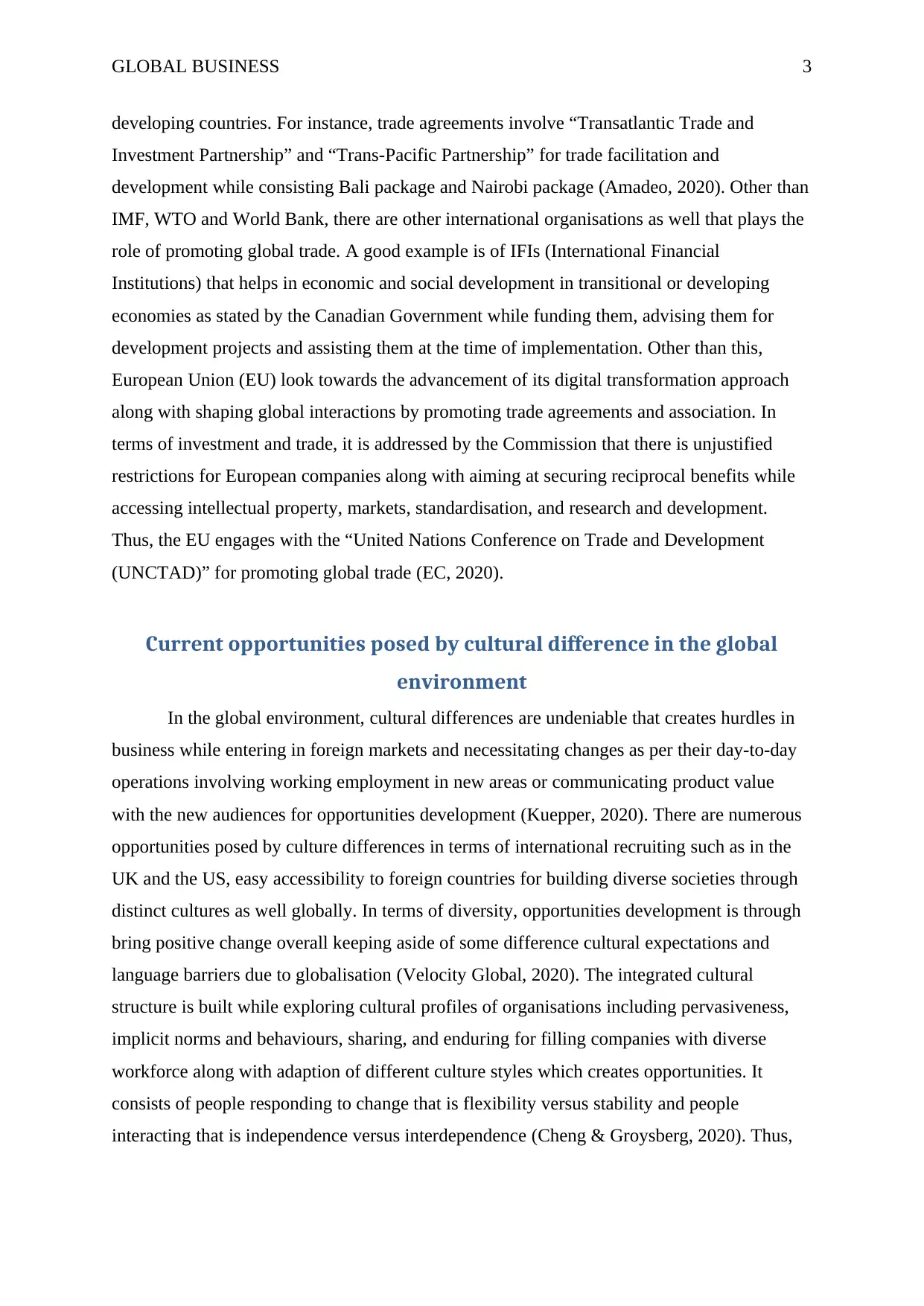
GLOBAL BUSINESS 3
developing countries. For instance, trade agreements involve “Transatlantic Trade and
Investment Partnership” and “Trans-Pacific Partnership” for trade facilitation and
development while consisting Bali package and Nairobi package (Amadeo, 2020). Other than
IMF, WTO and World Bank, there are other international organisations as well that plays the
role of promoting global trade. A good example is of IFIs (International Financial
Institutions) that helps in economic and social development in transitional or developing
economies as stated by the Canadian Government while funding them, advising them for
development projects and assisting them at the time of implementation. Other than this,
European Union (EU) look towards the advancement of its digital transformation approach
along with shaping global interactions by promoting trade agreements and association. In
terms of investment and trade, it is addressed by the Commission that there is unjustified
restrictions for European companies along with aiming at securing reciprocal benefits while
accessing intellectual property, markets, standardisation, and research and development.
Thus, the EU engages with the “United Nations Conference on Trade and Development
(UNCTAD)” for promoting global trade (EC, 2020).
Current opportunities posed by cultural difference in the global
environment
In the global environment, cultural differences are undeniable that creates hurdles in
business while entering in foreign markets and necessitating changes as per their day-to-day
operations involving working employment in new areas or communicating product value
with the new audiences for opportunities development (Kuepper, 2020). There are numerous
opportunities posed by culture differences in terms of international recruiting such as in the
UK and the US, easy accessibility to foreign countries for building diverse societies through
distinct cultures as well globally. In terms of diversity, opportunities development is through
bring positive change overall keeping aside of some difference cultural expectations and
language barriers due to globalisation (Velocity Global, 2020). The integrated cultural
structure is built while exploring cultural profiles of organisations including pervasiveness,
implicit norms and behaviours, sharing, and enduring for filling companies with diverse
workforce along with adaption of different culture styles which creates opportunities. It
consists of people responding to change that is flexibility versus stability and people
interacting that is independence versus interdependence (Cheng & Groysberg, 2020). Thus,
developing countries. For instance, trade agreements involve “Transatlantic Trade and
Investment Partnership” and “Trans-Pacific Partnership” for trade facilitation and
development while consisting Bali package and Nairobi package (Amadeo, 2020). Other than
IMF, WTO and World Bank, there are other international organisations as well that plays the
role of promoting global trade. A good example is of IFIs (International Financial
Institutions) that helps in economic and social development in transitional or developing
economies as stated by the Canadian Government while funding them, advising them for
development projects and assisting them at the time of implementation. Other than this,
European Union (EU) look towards the advancement of its digital transformation approach
along with shaping global interactions by promoting trade agreements and association. In
terms of investment and trade, it is addressed by the Commission that there is unjustified
restrictions for European companies along with aiming at securing reciprocal benefits while
accessing intellectual property, markets, standardisation, and research and development.
Thus, the EU engages with the “United Nations Conference on Trade and Development
(UNCTAD)” for promoting global trade (EC, 2020).
Current opportunities posed by cultural difference in the global
environment
In the global environment, cultural differences are undeniable that creates hurdles in
business while entering in foreign markets and necessitating changes as per their day-to-day
operations involving working employment in new areas or communicating product value
with the new audiences for opportunities development (Kuepper, 2020). There are numerous
opportunities posed by culture differences in terms of international recruiting such as in the
UK and the US, easy accessibility to foreign countries for building diverse societies through
distinct cultures as well globally. In terms of diversity, opportunities development is through
bring positive change overall keeping aside of some difference cultural expectations and
language barriers due to globalisation (Velocity Global, 2020). The integrated cultural
structure is built while exploring cultural profiles of organisations including pervasiveness,
implicit norms and behaviours, sharing, and enduring for filling companies with diverse
workforce along with adaption of different culture styles which creates opportunities. It
consists of people responding to change that is flexibility versus stability and people
interacting that is independence versus interdependence (Cheng & Groysberg, 2020). Thus,
Paraphrase This Document
Need a fresh take? Get an instant paraphrase of this document with our AI Paraphraser
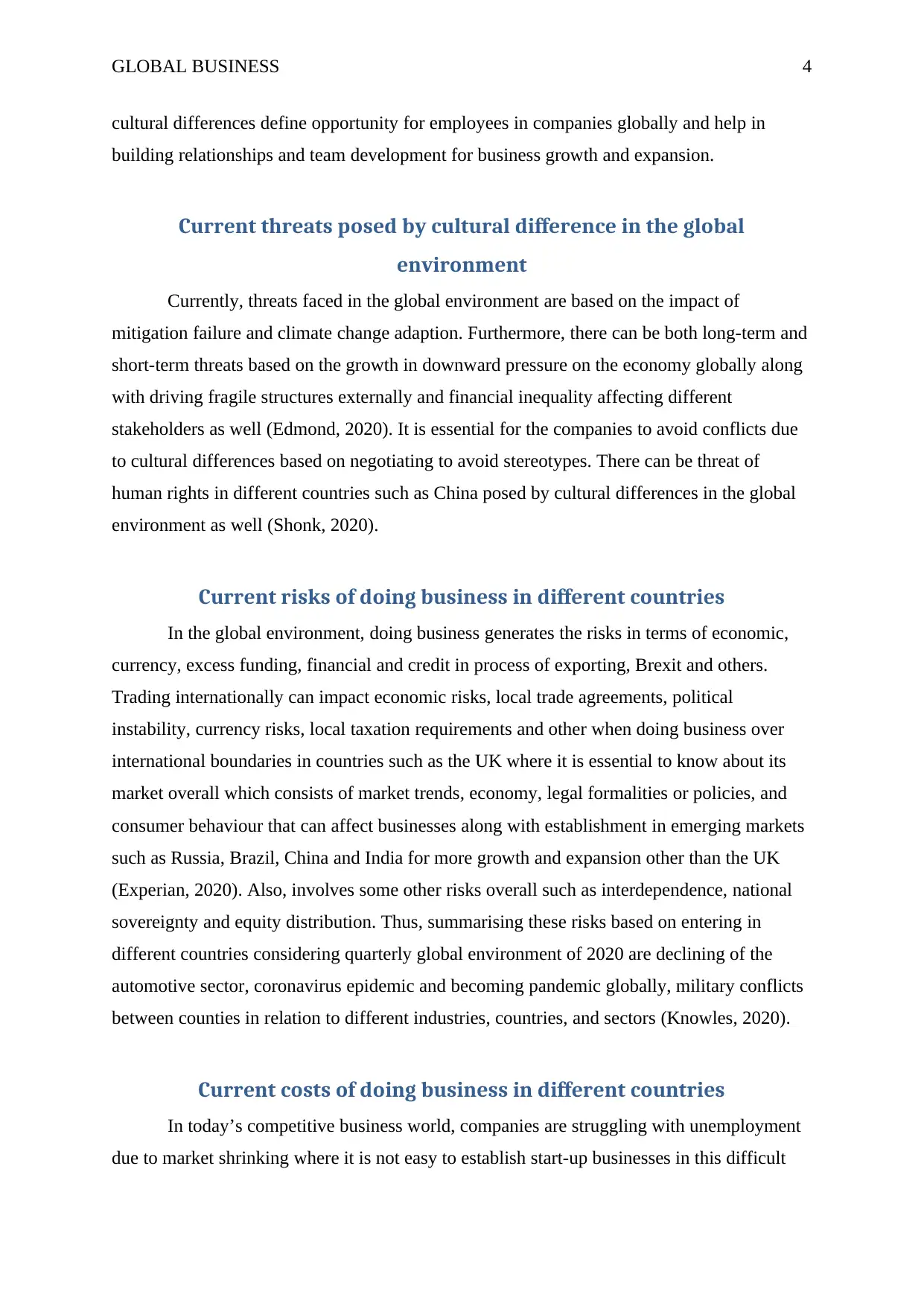
GLOBAL BUSINESS 4
cultural differences define opportunity for employees in companies globally and help in
building relationships and team development for business growth and expansion.
Current threats posed by cultural difference in the global
environment
Currently, threats faced in the global environment are based on the impact of
mitigation failure and climate change adaption. Furthermore, there can be both long-term and
short-term threats based on the growth in downward pressure on the economy globally along
with driving fragile structures externally and financial inequality affecting different
stakeholders as well (Edmond, 2020). It is essential for the companies to avoid conflicts due
to cultural differences based on negotiating to avoid stereotypes. There can be threat of
human rights in different countries such as China posed by cultural differences in the global
environment as well (Shonk, 2020).
Current risks of doing business in different countries
In the global environment, doing business generates the risks in terms of economic,
currency, excess funding, financial and credit in process of exporting, Brexit and others.
Trading internationally can impact economic risks, local trade agreements, political
instability, currency risks, local taxation requirements and other when doing business over
international boundaries in countries such as the UK where it is essential to know about its
market overall which consists of market trends, economy, legal formalities or policies, and
consumer behaviour that can affect businesses along with establishment in emerging markets
such as Russia, Brazil, China and India for more growth and expansion other than the UK
(Experian, 2020). Also, involves some other risks overall such as interdependence, national
sovereignty and equity distribution. Thus, summarising these risks based on entering in
different countries considering quarterly global environment of 2020 are declining of the
automotive sector, coronavirus epidemic and becoming pandemic globally, military conflicts
between counties in relation to different industries, countries, and sectors (Knowles, 2020).
Current costs of doing business in different countries
In today’s competitive business world, companies are struggling with unemployment
due to market shrinking where it is not easy to establish start-up businesses in this difficult
cultural differences define opportunity for employees in companies globally and help in
building relationships and team development for business growth and expansion.
Current threats posed by cultural difference in the global
environment
Currently, threats faced in the global environment are based on the impact of
mitigation failure and climate change adaption. Furthermore, there can be both long-term and
short-term threats based on the growth in downward pressure on the economy globally along
with driving fragile structures externally and financial inequality affecting different
stakeholders as well (Edmond, 2020). It is essential for the companies to avoid conflicts due
to cultural differences based on negotiating to avoid stereotypes. There can be threat of
human rights in different countries such as China posed by cultural differences in the global
environment as well (Shonk, 2020).
Current risks of doing business in different countries
In the global environment, doing business generates the risks in terms of economic,
currency, excess funding, financial and credit in process of exporting, Brexit and others.
Trading internationally can impact economic risks, local trade agreements, political
instability, currency risks, local taxation requirements and other when doing business over
international boundaries in countries such as the UK where it is essential to know about its
market overall which consists of market trends, economy, legal formalities or policies, and
consumer behaviour that can affect businesses along with establishment in emerging markets
such as Russia, Brazil, China and India for more growth and expansion other than the UK
(Experian, 2020). Also, involves some other risks overall such as interdependence, national
sovereignty and equity distribution. Thus, summarising these risks based on entering in
different countries considering quarterly global environment of 2020 are declining of the
automotive sector, coronavirus epidemic and becoming pandemic globally, military conflicts
between counties in relation to different industries, countries, and sectors (Knowles, 2020).
Current costs of doing business in different countries
In today’s competitive business world, companies are struggling with unemployment
due to market shrinking where it is not easy to establish start-up businesses in this difficult
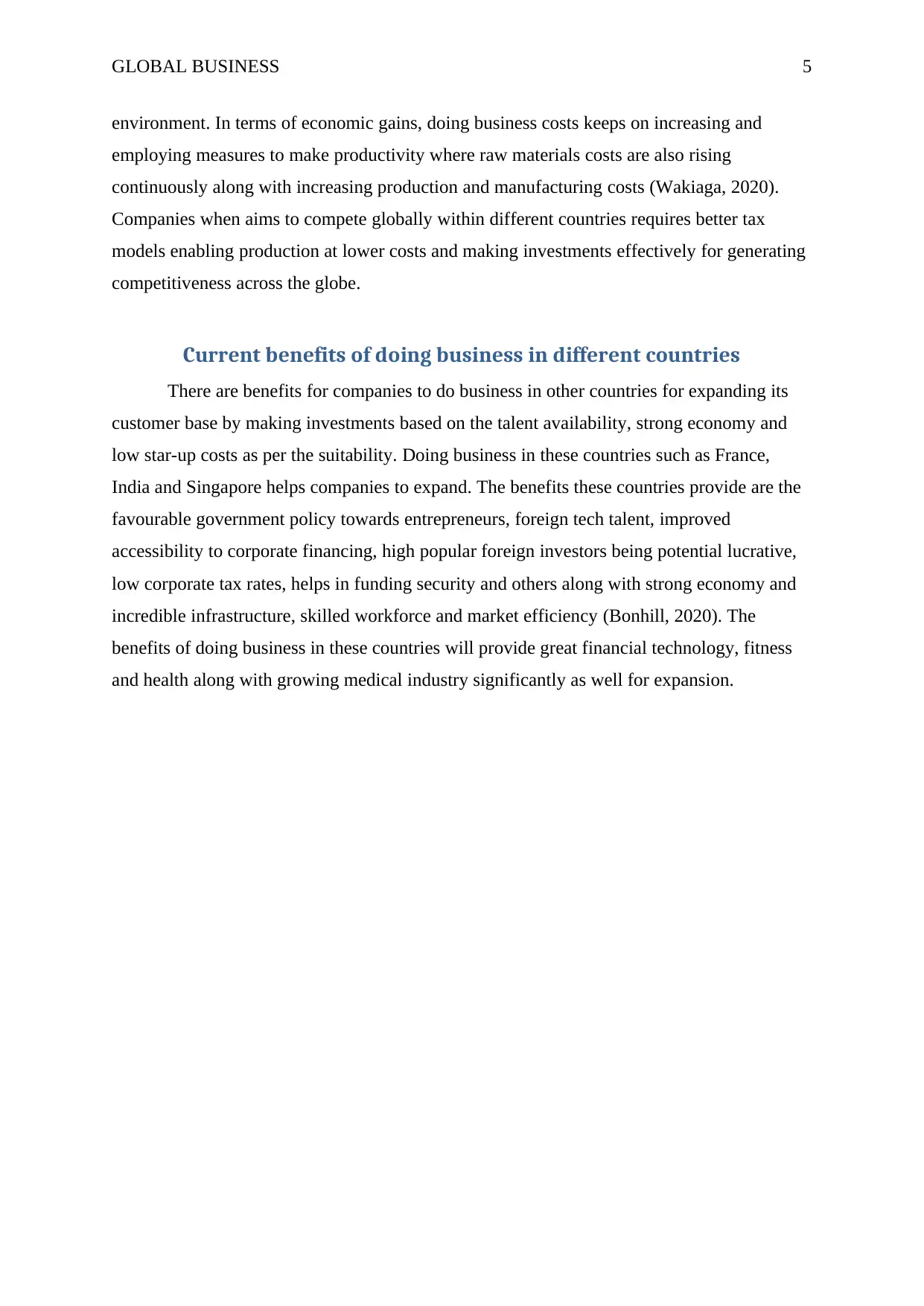
GLOBAL BUSINESS 5
environment. In terms of economic gains, doing business costs keeps on increasing and
employing measures to make productivity where raw materials costs are also rising
continuously along with increasing production and manufacturing costs (Wakiaga, 2020).
Companies when aims to compete globally within different countries requires better tax
models enabling production at lower costs and making investments effectively for generating
competitiveness across the globe.
Current benefits of doing business in different countries
There are benefits for companies to do business in other countries for expanding its
customer base by making investments based on the talent availability, strong economy and
low star-up costs as per the suitability. Doing business in these countries such as France,
India and Singapore helps companies to expand. The benefits these countries provide are the
favourable government policy towards entrepreneurs, foreign tech talent, improved
accessibility to corporate financing, high popular foreign investors being potential lucrative,
low corporate tax rates, helps in funding security and others along with strong economy and
incredible infrastructure, skilled workforce and market efficiency (Bonhill, 2020). The
benefits of doing business in these countries will provide great financial technology, fitness
and health along with growing medical industry significantly as well for expansion.
environment. In terms of economic gains, doing business costs keeps on increasing and
employing measures to make productivity where raw materials costs are also rising
continuously along with increasing production and manufacturing costs (Wakiaga, 2020).
Companies when aims to compete globally within different countries requires better tax
models enabling production at lower costs and making investments effectively for generating
competitiveness across the globe.
Current benefits of doing business in different countries
There are benefits for companies to do business in other countries for expanding its
customer base by making investments based on the talent availability, strong economy and
low star-up costs as per the suitability. Doing business in these countries such as France,
India and Singapore helps companies to expand. The benefits these countries provide are the
favourable government policy towards entrepreneurs, foreign tech talent, improved
accessibility to corporate financing, high popular foreign investors being potential lucrative,
low corporate tax rates, helps in funding security and others along with strong economy and
incredible infrastructure, skilled workforce and market efficiency (Bonhill, 2020). The
benefits of doing business in these countries will provide great financial technology, fitness
and health along with growing medical industry significantly as well for expansion.
⊘ This is a preview!⊘
Do you want full access?
Subscribe today to unlock all pages.

Trusted by 1+ million students worldwide
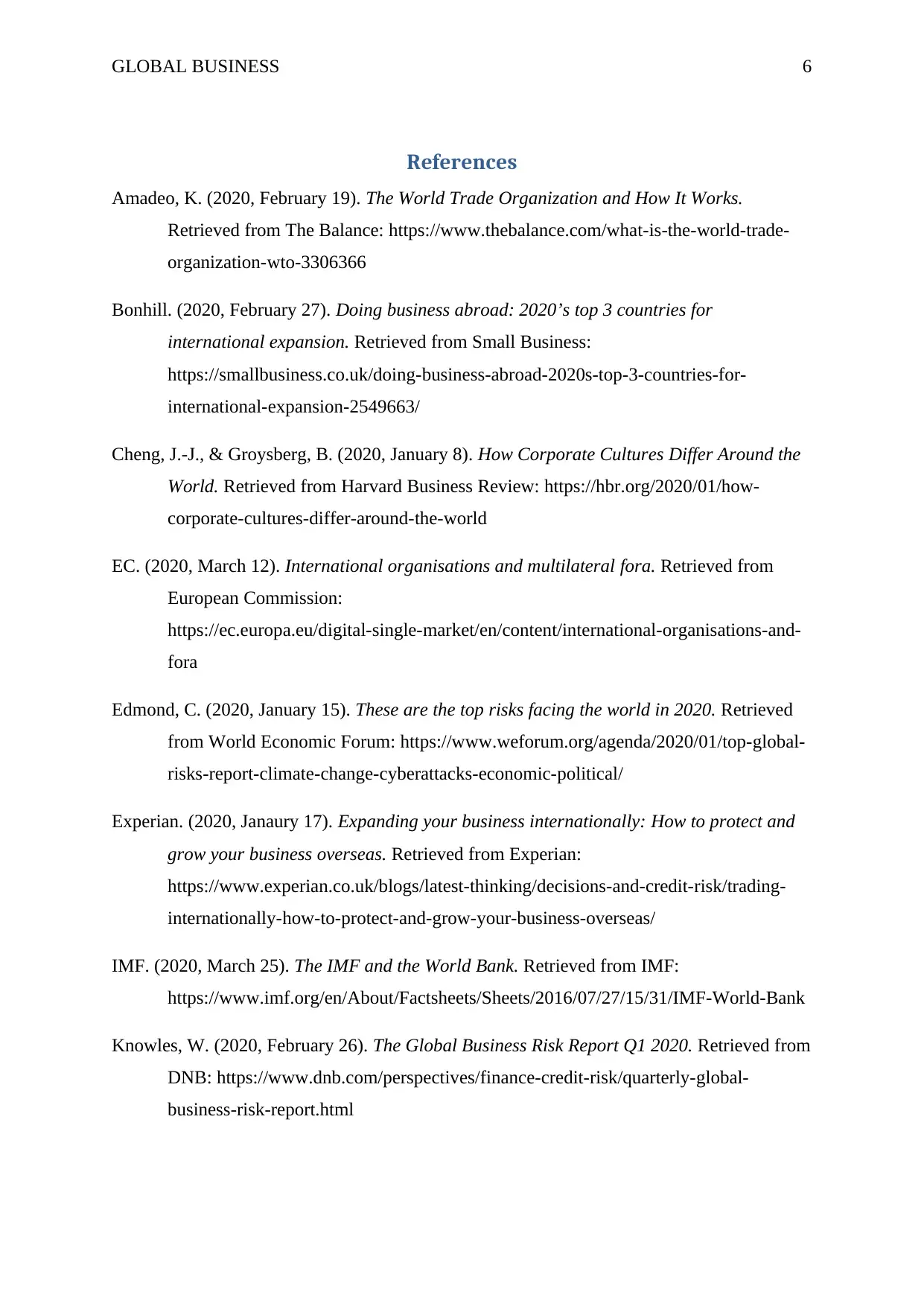
GLOBAL BUSINESS 6
References
Amadeo, K. (2020, February 19). The World Trade Organization and How It Works.
Retrieved from The Balance: https://www.thebalance.com/what-is-the-world-trade-
organization-wto-3306366
Bonhill. (2020, February 27). Doing business abroad: 2020’s top 3 countries for
international expansion. Retrieved from Small Business:
https://smallbusiness.co.uk/doing-business-abroad-2020s-top-3-countries-for-
international-expansion-2549663/
Cheng, J.-J., & Groysberg, B. (2020, January 8). How Corporate Cultures Differ Around the
World. Retrieved from Harvard Business Review: https://hbr.org/2020/01/how-
corporate-cultures-differ-around-the-world
EC. (2020, March 12). International organisations and multilateral fora. Retrieved from
European Commission:
https://ec.europa.eu/digital-single-market/en/content/international-organisations-and-
fora
Edmond, C. (2020, January 15). These are the top risks facing the world in 2020. Retrieved
from World Economic Forum: https://www.weforum.org/agenda/2020/01/top-global-
risks-report-climate-change-cyberattacks-economic-political/
Experian. (2020, Janaury 17). Expanding your business internationally: How to protect and
grow your business overseas. Retrieved from Experian:
https://www.experian.co.uk/blogs/latest-thinking/decisions-and-credit-risk/trading-
internationally-how-to-protect-and-grow-your-business-overseas/
IMF. (2020, March 25). The IMF and the World Bank. Retrieved from IMF:
https://www.imf.org/en/About/Factsheets/Sheets/2016/07/27/15/31/IMF-World-Bank
Knowles, W. (2020, February 26). The Global Business Risk Report Q1 2020. Retrieved from
DNB: https://www.dnb.com/perspectives/finance-credit-risk/quarterly-global-
business-risk-report.html
References
Amadeo, K. (2020, February 19). The World Trade Organization and How It Works.
Retrieved from The Balance: https://www.thebalance.com/what-is-the-world-trade-
organization-wto-3306366
Bonhill. (2020, February 27). Doing business abroad: 2020’s top 3 countries for
international expansion. Retrieved from Small Business:
https://smallbusiness.co.uk/doing-business-abroad-2020s-top-3-countries-for-
international-expansion-2549663/
Cheng, J.-J., & Groysberg, B. (2020, January 8). How Corporate Cultures Differ Around the
World. Retrieved from Harvard Business Review: https://hbr.org/2020/01/how-
corporate-cultures-differ-around-the-world
EC. (2020, March 12). International organisations and multilateral fora. Retrieved from
European Commission:
https://ec.europa.eu/digital-single-market/en/content/international-organisations-and-
fora
Edmond, C. (2020, January 15). These are the top risks facing the world in 2020. Retrieved
from World Economic Forum: https://www.weforum.org/agenda/2020/01/top-global-
risks-report-climate-change-cyberattacks-economic-political/
Experian. (2020, Janaury 17). Expanding your business internationally: How to protect and
grow your business overseas. Retrieved from Experian:
https://www.experian.co.uk/blogs/latest-thinking/decisions-and-credit-risk/trading-
internationally-how-to-protect-and-grow-your-business-overseas/
IMF. (2020, March 25). The IMF and the World Bank. Retrieved from IMF:
https://www.imf.org/en/About/Factsheets/Sheets/2016/07/27/15/31/IMF-World-Bank
Knowles, W. (2020, February 26). The Global Business Risk Report Q1 2020. Retrieved from
DNB: https://www.dnb.com/perspectives/finance-credit-risk/quarterly-global-
business-risk-report.html
Paraphrase This Document
Need a fresh take? Get an instant paraphrase of this document with our AI Paraphraser
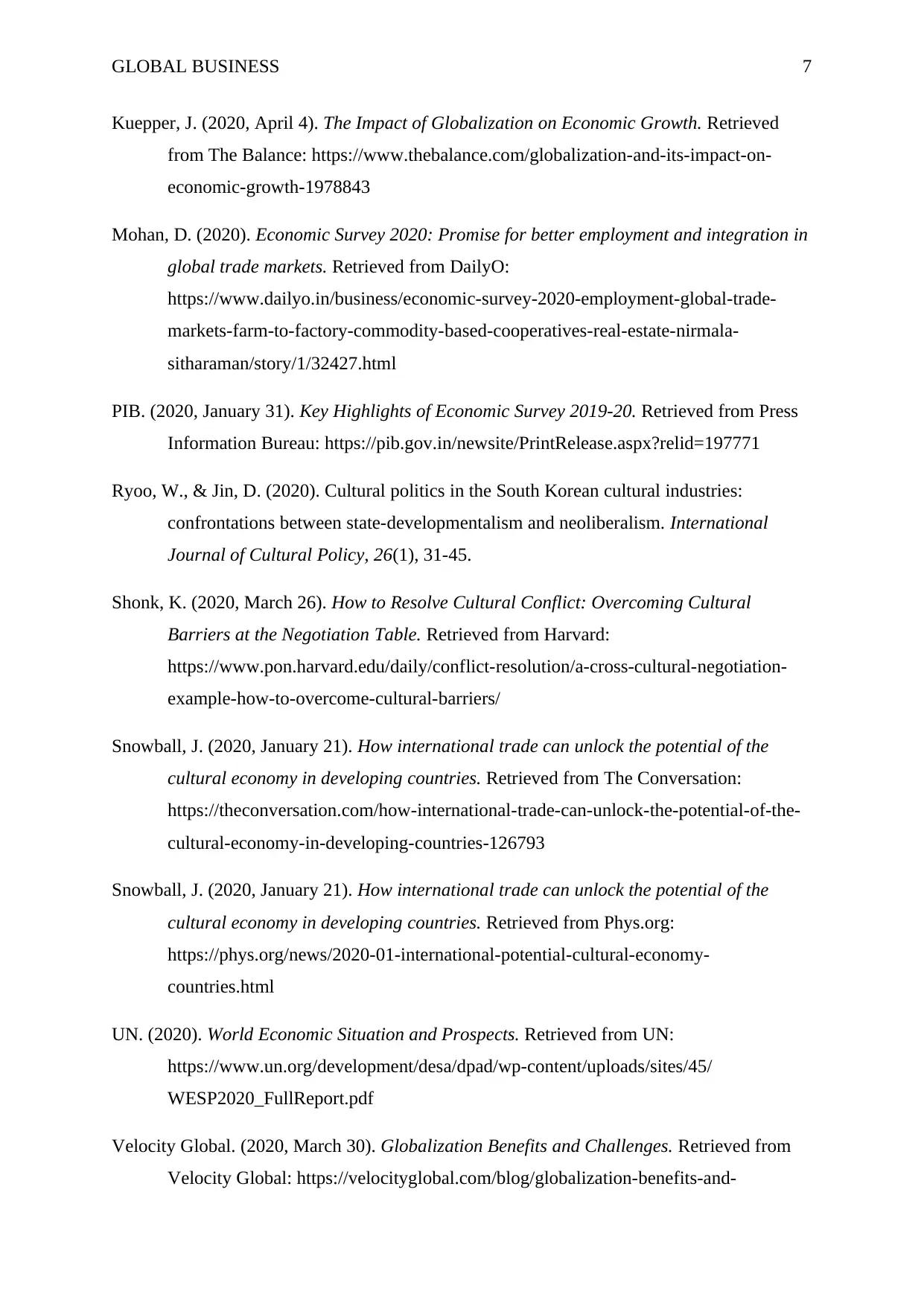
GLOBAL BUSINESS 7
Kuepper, J. (2020, April 4). The Impact of Globalization on Economic Growth. Retrieved
from The Balance: https://www.thebalance.com/globalization-and-its-impact-on-
economic-growth-1978843
Mohan, D. (2020). Economic Survey 2020: Promise for better employment and integration in
global trade markets. Retrieved from DailyO:
https://www.dailyo.in/business/economic-survey-2020-employment-global-trade-
markets-farm-to-factory-commodity-based-cooperatives-real-estate-nirmala-
sitharaman/story/1/32427.html
PIB. (2020, January 31). Key Highlights of Economic Survey 2019-20. Retrieved from Press
Information Bureau: https://pib.gov.in/newsite/PrintRelease.aspx?relid=197771
Ryoo, W., & Jin, D. (2020). Cultural politics in the South Korean cultural industries:
confrontations between state-developmentalism and neoliberalism. International
Journal of Cultural Policy, 26(1), 31-45.
Shonk, K. (2020, March 26). How to Resolve Cultural Conflict: Overcoming Cultural
Barriers at the Negotiation Table. Retrieved from Harvard:
https://www.pon.harvard.edu/daily/conflict-resolution/a-cross-cultural-negotiation-
example-how-to-overcome-cultural-barriers/
Snowball, J. (2020, January 21). How international trade can unlock the potential of the
cultural economy in developing countries. Retrieved from The Conversation:
https://theconversation.com/how-international-trade-can-unlock-the-potential-of-the-
cultural-economy-in-developing-countries-126793
Snowball, J. (2020, January 21). How international trade can unlock the potential of the
cultural economy in developing countries. Retrieved from Phys.org:
https://phys.org/news/2020-01-international-potential-cultural-economy-
countries.html
UN. (2020). World Economic Situation and Prospects. Retrieved from UN:
https://www.un.org/development/desa/dpad/wp-content/uploads/sites/45/
WESP2020_FullReport.pdf
Velocity Global. (2020, March 30). Globalization Benefits and Challenges. Retrieved from
Velocity Global: https://velocityglobal.com/blog/globalization-benefits-and-
Kuepper, J. (2020, April 4). The Impact of Globalization on Economic Growth. Retrieved
from The Balance: https://www.thebalance.com/globalization-and-its-impact-on-
economic-growth-1978843
Mohan, D. (2020). Economic Survey 2020: Promise for better employment and integration in
global trade markets. Retrieved from DailyO:
https://www.dailyo.in/business/economic-survey-2020-employment-global-trade-
markets-farm-to-factory-commodity-based-cooperatives-real-estate-nirmala-
sitharaman/story/1/32427.html
PIB. (2020, January 31). Key Highlights of Economic Survey 2019-20. Retrieved from Press
Information Bureau: https://pib.gov.in/newsite/PrintRelease.aspx?relid=197771
Ryoo, W., & Jin, D. (2020). Cultural politics in the South Korean cultural industries:
confrontations between state-developmentalism and neoliberalism. International
Journal of Cultural Policy, 26(1), 31-45.
Shonk, K. (2020, March 26). How to Resolve Cultural Conflict: Overcoming Cultural
Barriers at the Negotiation Table. Retrieved from Harvard:
https://www.pon.harvard.edu/daily/conflict-resolution/a-cross-cultural-negotiation-
example-how-to-overcome-cultural-barriers/
Snowball, J. (2020, January 21). How international trade can unlock the potential of the
cultural economy in developing countries. Retrieved from The Conversation:
https://theconversation.com/how-international-trade-can-unlock-the-potential-of-the-
cultural-economy-in-developing-countries-126793
Snowball, J. (2020, January 21). How international trade can unlock the potential of the
cultural economy in developing countries. Retrieved from Phys.org:
https://phys.org/news/2020-01-international-potential-cultural-economy-
countries.html
UN. (2020). World Economic Situation and Prospects. Retrieved from UN:
https://www.un.org/development/desa/dpad/wp-content/uploads/sites/45/
WESP2020_FullReport.pdf
Velocity Global. (2020, March 30). Globalization Benefits and Challenges. Retrieved from
Velocity Global: https://velocityglobal.com/blog/globalization-benefits-and-
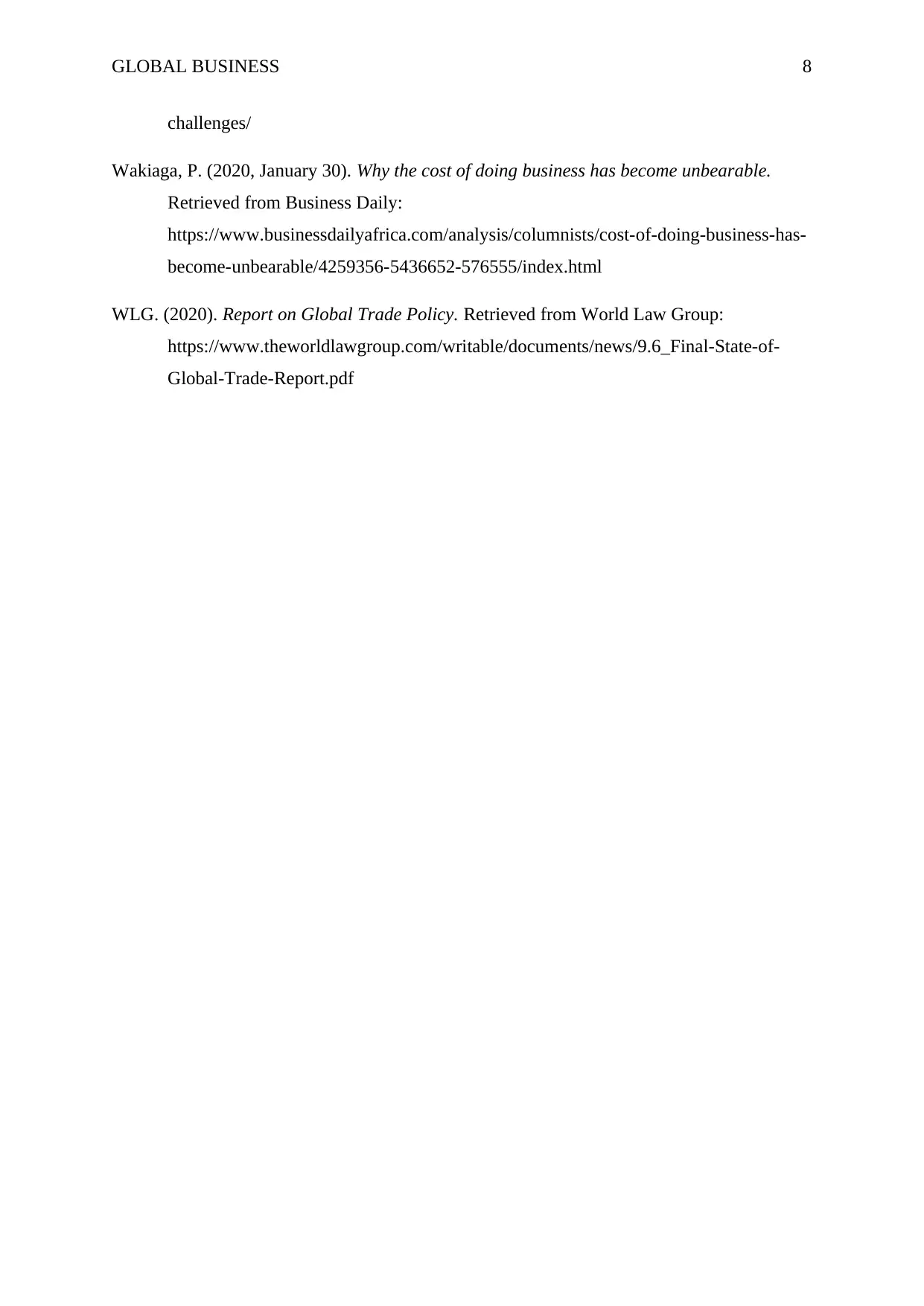
GLOBAL BUSINESS 8
challenges/
Wakiaga, P. (2020, January 30). Why the cost of doing business has become unbearable.
Retrieved from Business Daily:
https://www.businessdailyafrica.com/analysis/columnists/cost-of-doing-business-has-
become-unbearable/4259356-5436652-576555/index.html
WLG. (2020). Report on Global Trade Policy. Retrieved from World Law Group:
https://www.theworldlawgroup.com/writable/documents/news/9.6_Final-State-of-
Global-Trade-Report.pdf
challenges/
Wakiaga, P. (2020, January 30). Why the cost of doing business has become unbearable.
Retrieved from Business Daily:
https://www.businessdailyafrica.com/analysis/columnists/cost-of-doing-business-has-
become-unbearable/4259356-5436652-576555/index.html
WLG. (2020). Report on Global Trade Policy. Retrieved from World Law Group:
https://www.theworldlawgroup.com/writable/documents/news/9.6_Final-State-of-
Global-Trade-Report.pdf
⊘ This is a preview!⊘
Do you want full access?
Subscribe today to unlock all pages.

Trusted by 1+ million students worldwide
1 out of 9
Related Documents
Your All-in-One AI-Powered Toolkit for Academic Success.
+13062052269
info@desklib.com
Available 24*7 on WhatsApp / Email
![[object Object]](/_next/static/media/star-bottom.7253800d.svg)
Unlock your academic potential
Copyright © 2020–2025 A2Z Services. All Rights Reserved. Developed and managed by ZUCOL.





